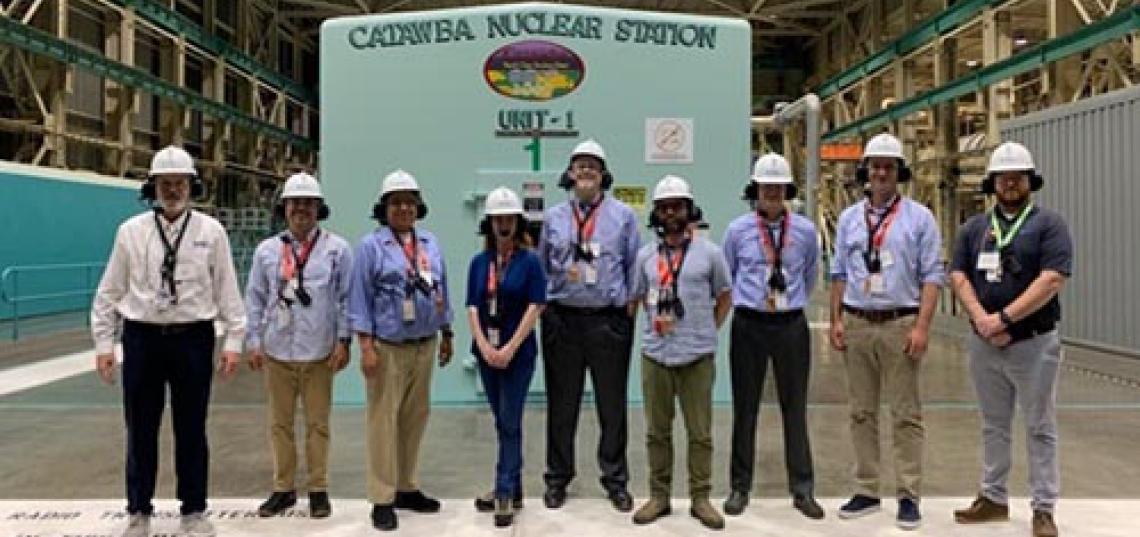
The U.S. Department of Energy has awarded SC&I Professor of Communication Matthew Weber and his colleagues three grants in the past year totaling nearly $4 million (of which the SC&I portion is nearly $2 million) to fund three research projects. Two of those grants were awarded this past September.
All three projects are designed to assist the U.S. Department of Energy to better understand how public audiences and DOE partners (other organizations the DOE works with) identify trusted information and help the DOE understand how to better communicate complex scientific information with a variety of external audiences including the general public.
“We are looking at how public audiences and stakeholders identify and select information they trust and how they make sense of complex information that's being shared about energy production,” Weber said.
“We are looking at how public audiences and stakeholders identify and select information they trust and how they make sense of complex information that's being shared about energy production,” Weber said.
Weber is a co-principal investigator for the first two projects, and he is the principal investigator for the third. The grants are enabling Weber to fund three SC&I doctoral students.
The project “Moving toward consent-based siting of a federal CISF: improving strategies for community-led decision-making during stakeholder and tribal engagements” (Krahn, S., Henry, M., Greenberg, M., Burger, J., Weber, M. S., Higley, K. and Kosson, D.), focuses on understanding public trust in information related to nuclear energy production within focal communities.
“Informing Consent-Based Siting of a Consolidated Interim Storage Facility (CISF): Examining Public Engagement Through History and Evaluation of Prior & Current Outreach Results” (Krahn, S., Weber, M. S., Greenberg, M. and Henry, M.), funded by the DOE Office of Environmental Management, involves community research examining how people learn about and decide to trust information related to nuclear facilities.
“A National Framework for Effective and Sustainable Stakeholder Engagement in Complex Environments” (Weber, M., Greenberg M., Burger J. (all from Rutgers), Higley K., Kosson, D.) with Weber as principal investigator, aims to develop a national framework for effective stakeholder engagement by the Department of Energy’s Office of Environmental Management.
The three projects will be managed through the Consortium for Risk Evaluation with Stakeholder Participation (CRESP), an independent consortium of researchers that is advisory to the Department of Energy on issues regarding stakeholder communication.
Weber said a year ago the research team began working on the first project. According to Weber, “We are helping the Department of Energy to understand how to communicate the complex scientific information they need to share with the public, and untangle the challenges of communicating clearly to public audiences.”
To learn more about how the general public obtains and evaluates information from the DOE, Weber and his team are conducting community research through interviews with residents of communities where DOE nuclear facilities are already located as well as surveys and extensive analysis of public documents.
“We are out in communities where there are nuclear facilities, and we're talking to community members and stakeholders, and asking, how did you learn about the nuclear facility? How do you decide what information about the facility you trust? How do you decide what might be misinformation? How do you check your sources?”
Weber said, “We are out in communities where there are nuclear facilities, and we're talking to community members and stakeholders, and asking, how did you learn about the nuclear facility? How do you decide what information about the facility you trust? How do you decide what might be misinformation? How do you check your sources?”
In order to understand how the DOE approaches these challenges, the research team will interview public relations officials within the Department of Energy's Office of Environment, including officials working at DOE national sites including the Oak Ridge Site in Tennessee; the Los Alamos National Lab in New Mexico; and the Hanford Site in Washington State, among others. These interviews, Weber said, will help his team to understand how the DOE public relations officials have thought about stakeholder engagement in the past.
“The overarching issues that all three projects address,” Weber said, “focus on the Department of Energy being able to communicate clearly about these complex issues that they're addressing. It's critical to their mission and It's also critical to so many of the communities that are served by the DOE.”
Learn more about the Communication Department at the Rutgers School of Communication and Information on the website.
Photo: Matt Weber (second from the right) at the Catawba Nuclear Station in South Carolina. Courtesy of Matt Weber.
